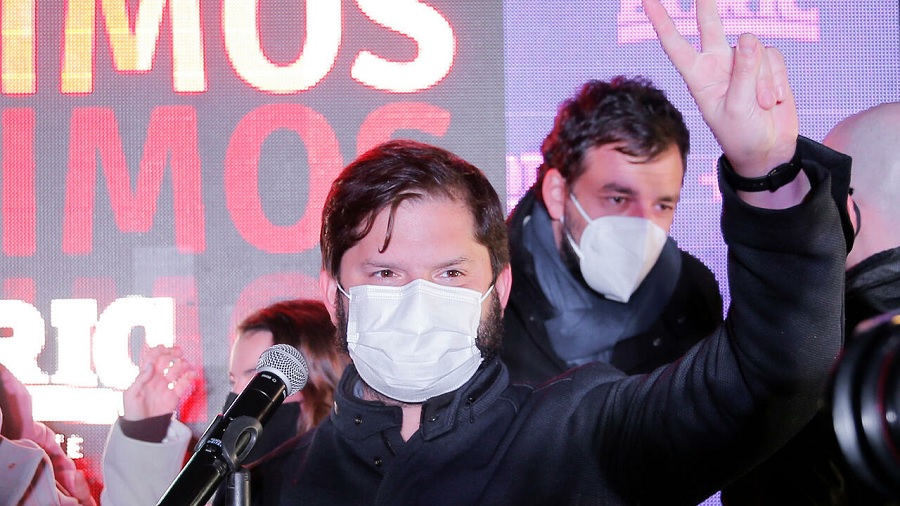RIO DE JANEIRO, BRAZIL – The Unidad Constituyente (UC), a coalition of more traditional left-wing parties which has been struggling for several years, was left out of the game for failing to agree, and is now debating whether to present its own candidacy or support Gabriel Boric, who imposed himself as a progressive presidential candidate.
Against all odds, ex-student leader Boric of the Frente Amplio (FA), a movement similar to Spain’s Podemos born in 2017, defeated communist Daniel Jadue, right-wing independent ex-minister Sebastián Sichel and beat ultra-conservative Joaquín Lavín, a heavyweight in Chilean politics.

This victory has been described by experts as a further punishment to “the old politics,” a phenomenon that has been occurring at the polls in all elections called since the 2019 social protests exploded, and as a rejection of extremism, emerging in Latin America.
“Chile has given a solution to its political polarization with a vote that reflects that there is rejection of traditional candidates, but within limits,” Jaime Abedrapo said, director of the School of Government at the San Sebastian University.
Both Boric and Sichel, 35 and 43 years old respectively, are the first candidates for the Chilean presidency born after the coup d’état (1973), and could succeed right-wing Sebastián Piñera as of March 2022.
THE QUESTION FOR THE CENTER-LEFT
The remaining parties and independent candidacies have until August 23 to officialize their presidential proposal for the elections, which will be held in the first round on November 21, with the center-left as the main bloc that has yet to be defined.
“The picture is incomplete. A fundamental political sector is missing: democratic socialism and progressivism which cannot renounce participating in these presidential elections,” complained Paula Narváez, the socialist presidential hopeful who was left out of the official primaries and urged the bloc to organize itself.
Narváez, whose candidacy was supported by ex-president Michelle Bachelet, is one of the moderate left’s favorites, along with Christian Democrat and Senate president Yasna Provoste, who has not yet confirmed her intention to run.
Claudia Heiss, a political scientist at the University of Chile, explained that Boric’s triumph is “bad news” for either of the two, since the pro-Amplista front-runner has a program similar to theirs and could undermine their outcome.
For Abedrapo, the center-left will have to deploy an important strategy in order not to fade away from the electoral map and, despite the fact that Provoste has a narrow margin to position herself, she is “the ideal one” for being the most distinct from Boric.
Under different names, the moderate left has shared power with the right for over 30 years after the end of Augusto Pinochet’s dictatorship (1973-1990), but its influence has been fading after its defeat in the 2017 presidential elections.
Its latest defeat in the constituent and municipal elections, where it obtained only 25 of the 155 seats in the body that will draft the new Constitution and a handful of mayoralties, rattled the entire left and pushed it out of the primaries.
KEEPING 1 MILLION VOTES
Mayor Jadue’s defeat, who until now was leading the polls, was the biggest surprise of Sunday’s vote, in which over 20% of registered voters participated and which stood out for the increase of the “urban vote,” leaving the Communists without candidates in the race for La Moneda.
Communist party deputy Karol Cariola said that it will be “a challenge” to persuade her electorate to mobilize for Boric, but she trusts that he will achieve an “important projection” from the Apruebo Dignidad (left) pact in the presidential elections.
According to experts, Boric’s decisive triumph places him strongly for the presidential elections, but by then he will need to maintain the 1 million votes he achieved in these primaries (in a country of 19 million inhabitants).
Director of Latinobarómetro pollster Marta Lagos said that, regarding the next Chilean government “there are many hypotheses,” but that “70% of the country does not want a second right-wing government.”
Chile has been experiencing a deep social, political and institutional crisis since 2019, with a conservative president who reached a historic low approval rating of 9% in April and whose successor will face the task of implementing the rules of a new Constitution.

